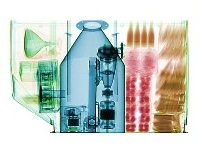Letter bombs to be thwarted by tech?

Increasing the amount of cargo scanned in order to catch letter bombs hidden in electronic equipment could grind international trade to a halt, according to experts, but technology could provide an answer.

Increasing cargo scans to catch letter bombs hidden in electronic equipment could grind trade to a halt (Credit: CSIRO)
National security agencies were sent scrambling at the end of last week after two letter bombs concealed in printer cartridges were intercepted en route by air to targets in the United States.
The bombs slipped through customs checks and were caught by inspectors in Dubai and Britain on Friday.
Counter-terrorism expert and ANU Professor Michael McKinley said that less than 10 per cent of commercial cargo is scanned for illegal material, but said that the true figure is a closely guarded secret.
"Ultimately, it is a matter of accepting risk," McKinley said. "Electronic devices present a difficult challenge for inspectors."
"An awful lot of inspections on airlines requires interpretation. They look at literally thousands of images in a day … something is bound to get through.
"Scanning items is very expensive, because containers are so large and you can hide things in the middle if you know what you are doing."
He said customs has no choice but to forgo scanning the bulk of goods because the cost of doing so is prohibitive and would grind trade to a halt.
But none outside of the tight-lipped organisations that conduct Australia's cargo screening know the true strength and weaknesses of the system, according to McKinley.
Composition information appears as different colours ranging from blue (metals) to red (organic materials) (Credit: CSIRO)
Questions to the Department of Infrastructure regarding the process of scanning and screening cargo were pushed to Customs and Border Protection.
Customs did not respond to similar requests at the time of publication.
In the past, Customs officials have turned to technology to try and improve the accuracy of scanning, so items don't slip through the gaps.
The CSIRO has commercialised air cargo scanning technology, which couples gamma-ray and neutron radiography to produce detailed images that show the material composition of items in addition to their size and shape. Part of government counter-terrorism measures, the scanner is more adept than existing technologies at detecting explosives and related security threats.
The technology was tested in a nine-month, $8.4 million trial at a commercial Customs facility at Brisbane Airport between 2006 and 2007.
It won praise from the Minister for Defence Personnel, Materiel and Science, Greg Combet, who said the CSIRO scanner will help operators better detect explosives than current technology.
But according to the Custom's 2007 annual report, the trial showed the neutron scanner "had a comparable detection capability to that of existing technologies deployed by Customs".
Now, years later, the CSIRO and Chinese security inspection specialist NuTech are in talks to get the technology into airports.
No Australian companies are yet using the scanners, according to Dr Nick Cutmore, who led development of the CSIRO technology. He said the agency is in discussions with local organisations but would not reveal further details.
CSIRO has sold the first unit to Belgrade Airport. The units each go for around $3 to $4 million, according to Cutmore. He said that the unit had the capability to scan every single piece of cargo that passes through the airport.
In the meantime
The US has banned further air cargo shipments from Yemen where the letter bombs were sent. The bans also mean Australia will no longer receive goods from the terrorism hotspot due to logistics chains.
"You don't need to be a genius to work out [bombs] will start coming from somewhere else," McKinley said.
"Every time you bring in a counter-measure there is a reaction."
Passengers may be required to wear "flight suits" and deliver baggage to airports days in advance of flights if letter bomb-style attacks continue.
McKinley proposed the idea some 25 years ago that passengers will be required to don protective suits as a counter-terrorism measure.
"There will be a whole range of new stringent measures that come into force if there is another attack," he said.